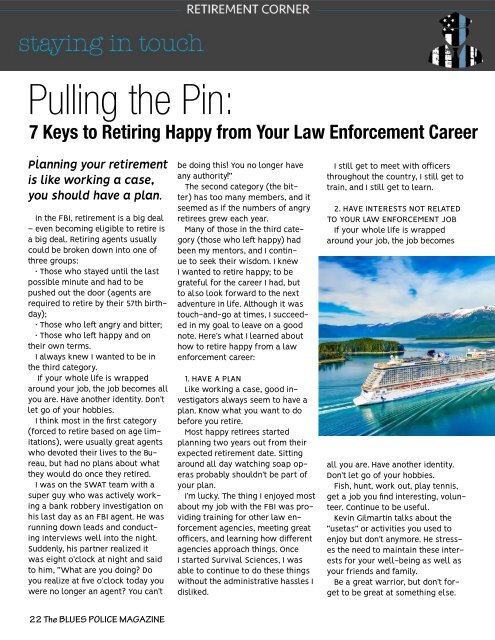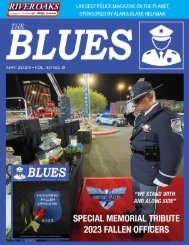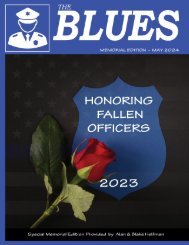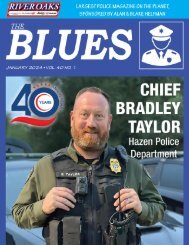March 2020 Blues Vol 36 No 3
The BLUES Police Magazine, March 2020 Blues Vol 36 No 3
The BLUES Police Magazine, March 2020 Blues Vol 36 No 3
Create successful ePaper yourself
Turn your PDF publications into a flip-book with our unique Google optimized e-Paper software.
Pulling the Pin:<br />
7 Keys to Retiring Happy from Your Law Enforcement Career<br />
.<br />
Planning your retirement<br />
is like working a case,<br />
you should have a plan.<br />
In the FBI, retirement is a big deal<br />
– even becoming eligible to retire is<br />
a big deal. Retiring agents usually<br />
could be broken down into one of<br />
three groups:<br />
• Those who stayed until the last<br />
possible minute and had to be<br />
pushed out the door (agents are<br />
required to retire by their 57th birthday);<br />
• Those who left angry and bitter;<br />
• Those who left happy and on<br />
their own terms.<br />
I always knew I wanted to be in<br />
the third category.<br />
If your whole life is wrapped<br />
around your job, the job becomes all<br />
you are. Have another identity. Don’t<br />
let go of your hobbies.<br />
I think most in the first category<br />
(forced to retire based on age limitations),<br />
were usually great agents<br />
who devoted their lives to the Bureau,<br />
but had no plans about what<br />
they would do once they retired.<br />
I was on the SWAT team with a<br />
super guy who was actively working<br />
a bank robbery investigation on<br />
his last day as an FBI agent. He was<br />
running down leads and conducting<br />
interviews well into the night.<br />
Suddenly, his partner realized it<br />
was eight o’clock at night and said<br />
to him, “What are you doing? Do<br />
you realize at five o’clock today you<br />
were no longer an agent? You can’t<br />
be doing this! You no longer have<br />
any authority!”<br />
The second category (the bitter)<br />
has too many members, and it<br />
seemed as if the numbers of angry<br />
retirees grew each year.<br />
Many of those in the third category<br />
(those who left happy) had<br />
been my mentors, and I continue<br />
to seek their wisdom. I knew<br />
I wanted to retire happy; to be<br />
grateful for the career I had, but<br />
to also look forward to the next<br />
adventure in life. Although it was<br />
touch-and-go at times, I succeeded<br />
in my goal to leave on a good<br />
note. Here’s what I learned about<br />
how to retire happy from a law<br />
enforcement career:<br />
1. HAVE A PLAN<br />
Like working a case, good investigators<br />
always seem to have a<br />
plan. Know what you want to do<br />
before you retire.<br />
Most happy retirees started<br />
planning two years out from their<br />
expected retirement date. Sitting<br />
around all day watching soap operas<br />
probably shouldn’t be part of<br />
your plan.<br />
I’m lucky. The thing I enjoyed most<br />
about my job with the FBI was providing<br />
training for other law enforcement<br />
agencies, meeting great<br />
officers, and learning how different<br />
agencies approach things. Once<br />
I started Survival Sciences, I was<br />
able to continue to do these things<br />
without the administrative hassles I<br />
disliked.<br />
I still get to meet with officers<br />
throughout the country, I still get to<br />
train, and I still get to learn.<br />
2. HAVE INTERESTS NOT RELATED<br />
TO YOUR LAW ENFORCEMENT JOB<br />
If your whole life is wrapped<br />
around your job, the job becomes<br />
all you are. Have another identity.<br />
Don’t let go of your hobbies.<br />
Fish, hunt, work out, play tennis,<br />
get a job you find interesting, volunteer.<br />
Continue to be useful.<br />
Kevin Gilmartin talks about the<br />
“usetas” or activities you used to<br />
enjoy but don’t anymore. He stresses<br />
the need to maintain these interests<br />
for your well-being as well as<br />
your friends and family.<br />
Be a great warrior, but don’t forget<br />
to be great at something else.<br />
Be a great parent, a great spouse,<br />
and a great friend. Have friends<br />
outside of law enforcement. It’s interesting<br />
to hear other perspectives.<br />
3. DON’T TAKE ON A VICTIM MEN-<br />
TALITY.<br />
This is a big one. Some people like<br />
to play the victim. Everyone I knew<br />
in the angry category had convinced<br />
themselves they had been victimized<br />
in some way, and some may<br />
have been right. But it does no good<br />
to be angry and bitter about issues<br />
you can’t control. Once people<br />
adopt the victim mentality, they can<br />
justify all sorts of bad behavior.<br />
Everyone you ever arrested believes<br />
they are a victim.<br />
When I was new to the job, I<br />
loved to listen to the old-timers<br />
talk about the Hoover years. One of<br />
the stories was that on graduation<br />
day, all new agents were told two<br />
things. The first was the FBI doesn’t<br />
owe you anything other than the<br />
two-weeks’ pay you just earned.<br />
The second is it’s not your FBI and it<br />
never will be your FBI. It belongs to<br />
the American people and that’s who<br />
we serve.<br />
It seems as if we sometimes start<br />
thinking our organization owes us.<br />
It’s natural to do so. You sacrifice<br />
so much that it only seems right<br />
to expect much in return. We can’t<br />
forget we represent the citizens we<br />
serve. It’s an awesome responsibility<br />
and an awesome privilege.<br />
4. NEVER LOVE ANYTHING THAT<br />
CAN’T LOVE YOU BACK<br />
A Special Agent-in-Charge told<br />
me that a few years back. I know<br />
the FBI can’t love me, so I shouldn’t<br />
expect it to. You shouldn’t expect<br />
your agency to love you, but you<br />
can, and should, love your organization’s<br />
mission – to protect and<br />
serve.<br />
We decided to have a career<br />
in law enforcement because we<br />
believe in the necessity and righteousness<br />
of our mission. If you<br />
are angry at your department, it’s<br />
not the department you’re mad<br />
at. You’re mad at an individual.<br />
If there is a problem, something<br />
that needs to be fixed, then fix it.<br />
Make your department better. If<br />
you can’t, then decide whether to<br />
work within the system or leave,<br />
but don’t be a victim. Don’t allow<br />
yourself to be placed in the role<br />
of the weak. Remember you control<br />
you. You control your emotions.<br />
You control your attitude.<br />
5. IT’S OKAY TO MISS THE PEO-<br />
PLE, BUT DON’T MISS THE JOB<br />
Almost every retired FBI employee<br />
I know has said, “I don’t<br />
miss the job, but I do miss the<br />
people.” That’s how it should be.<br />
You are working with highly dedicated<br />
and professional people.<br />
You’ve shared some great times<br />
and some tragic times with them.<br />
Treasure those moments and those<br />
people.<br />
6. RECOGNIZE THE PRIVILEGE OF<br />
BEING A WARRIOR<br />
You could have had a career in<br />
which your focus was on making<br />
money, but you didn’t. Instead, you<br />
decided to be a protector of your<br />
community, to serve others, and to<br />
accomplish something much greater<br />
than yourself, and that’s pretty cool.<br />
If you’ve worked in law enforcement<br />
long enough, I’d bet you’ve<br />
had days when you’ve thought, “If<br />
I should die right now, my time on<br />
earth has been well spent.”<br />
For me it included a SWAT operation<br />
in which we rescued several<br />
teenage girls who were being<br />
forced into prostitution, returning<br />
a kidnapped child to his parents,<br />
putting child molesters in prison,<br />
protecting firefighters during the LA<br />
riots, and being part of a team that<br />
put lots of evil people away for a<br />
long time.<br />
How many times have you<br />
thought, “I can’t believe they pay me<br />
to do this stuff!”<br />
7. DON’T FORGET YOU’RE A<br />
SHEEPDOG AND A WARRIOR<br />
You may retire, but you never stop<br />
being a protector. Always carry.<br />
Keep working out. Keep training.<br />
Continue to keep a watchful eye.<br />
Being a warrior is a life-long ambition...and<br />
a noble one.<br />
This article, originally published<br />
12/07/2011, has been updated several<br />
times over the years.<br />
About the author: Chuck Joyner<br />
was employed by the CIA from 1983<br />
to 1987, a Special Agent with the<br />
FBI from 1987 until his retirement in<br />
October 2011 and is currently a reserve<br />
police officer in Texas. During<br />
his career, Chuck worked Violent<br />
Crimes & Major Offenders Program,<br />
gang task force and training. He<br />
was a SWAT team operator, sniper<br />
and later served as the SWAT<br />
Commander. He has provided<br />
firearms, defensive tactics, chemical<br />
agent and tactical training<br />
to thousands of law enforcement<br />
officers and military personnel.<br />
Chuck has lectured internationally<br />
and throughout the U.S. on myriad<br />
law enforcement topics.<br />
22 The BLUES POLICE MAGAZINE The BLUES POLICE MAGAZINE 23


















